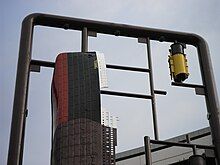Tony Stallard
Tony Stallard | |
|---|---|
 Titanic Kit by Tony Stallard (2009) | |
| Born | 26 August 1958 Bow, England, UK |
| Nationality | British |
| Education | Camberwell School of Art Wimbledon School of Art Duncan of Jordanstone College of Art and Design |
| Known for | Conceptual art, installation art, public art in the public realm |
Tony Stallard (born 26 August 1958) is an English artist, best known for his large scale public artworks in the United Kingdom and abroad,[1] which utilise bronze,[2] steel[3] and light sculptures for work in the public realm.[4]
Biography
[edit]Stallard studied at Camberwell College of Arts,[5] where he was influenced by Tony Carter and tutored by John Hilliard. Having started as a painter, Stallard then moved on to 3D work where he studied at Wimbledon College of Art[6] and developed his skills of site specific sculpture. Stallard subsequently went on to Duncan of Jordanstone College of Art and Design[6] in Dundee, which at the time was one of the few public art courses teaching the professional use of public art in the public realm.
Career in public art
[edit]Stallard has worked for twenty-five years in public artworks within the public realm[6] and his work has been exhibited widely from Canada to Ireland and the Czech Republic.[5] This work has included research and development within architectural and engineering practices, as well as processing artworks with multiple stake holders for practical engineered concepts towards public artworks.[6]
In 2009, Stallard was selected to by the Titanic Quarter and Arts And Business Northern Ireland to create a sculpture to promote the regeneration of the Titanic Quarter. A scale model of an Airfix kit, the piece was a reference to Belfast's industrial heritage and encourages a nostalgia for the area's shipbuilding history.[7]
Artworks
[edit]Selected works include:
- Double Helix (1999), a commission for Paddington Arts Centre.[8]
- The Frankenstein Project (2001), a piece which draws on Blackpool’s history of freak shows, which were active until World War II.[9]
- Seam (2002), a site specific light sculptural installation for Mayrau Mines, Czech Republic.[10]
- Ghost Train (2009), a project which aimed to regenerate a busy, polluted area into a gateway feature and progress Watford's ambitions to be a 'greener' more sustainable town[11]
- Titanic Kit (2009), a major, high-profile and contemporary site-specific light sculpture cast in bronze.[12]
- The Guardian (2010), an impressive 30-foot sculpture constructed of steel and neon which aimed to capture the historical significance of the landscape.[13]
References
[edit]- ^ "Public sculpture unveiled at the Titanic Quarter", "Belfast Telegraph"
- ^ "Sculpture Studios Art & Public Sculpture", "Sculpture Studios"
- ^ "Tony Stallard", "Art Design Cafe"
- ^ "Artcity brings art to the people" Archived 2010-12-31 at the Wayback Machine, "Fast Forward Weekly"
- ^ a b "The Two Minds Project: Tony Stallard" Archived 2014-08-08 at the Wayback Machine "Two Minds"
- ^ a b c d "Artist Talk" Archived 2012-03-25 at the Wayback Machine, "Yrkeshögskolan Novia"
- ^ "Titanic artwork unveiled in Belfast". BelfastTelegraph.co.uk. ISSN 0307-1235. Retrieved 21 January 2018.
- ^ "Double Helix" Archived 2011-03-14 at the Wayback Machine, "Neon Circus"
- ^ "The great promenade show: Blackpool, UK (2002)", "Art Design Cafe"
- ^ "Saatchi Online"
- ^ "Tony STALLARD, Ghost Train (2009)", "Public Art Directory"
- ^ "Kit... the first public artwork for Titanic Quarter", "Arts & Business"
- ^ "Public Art. The City of Calgary", "The City of Calgary"
External links
[edit]- Official website
- Secondary website
- Tony Stallard page at the ArtLyst website.
- Tony Stallard page at the Axis Web website.
- Tony Stallard page at the Saatchi Online website.
- Tony Stallard page at the Art Doxa website.
